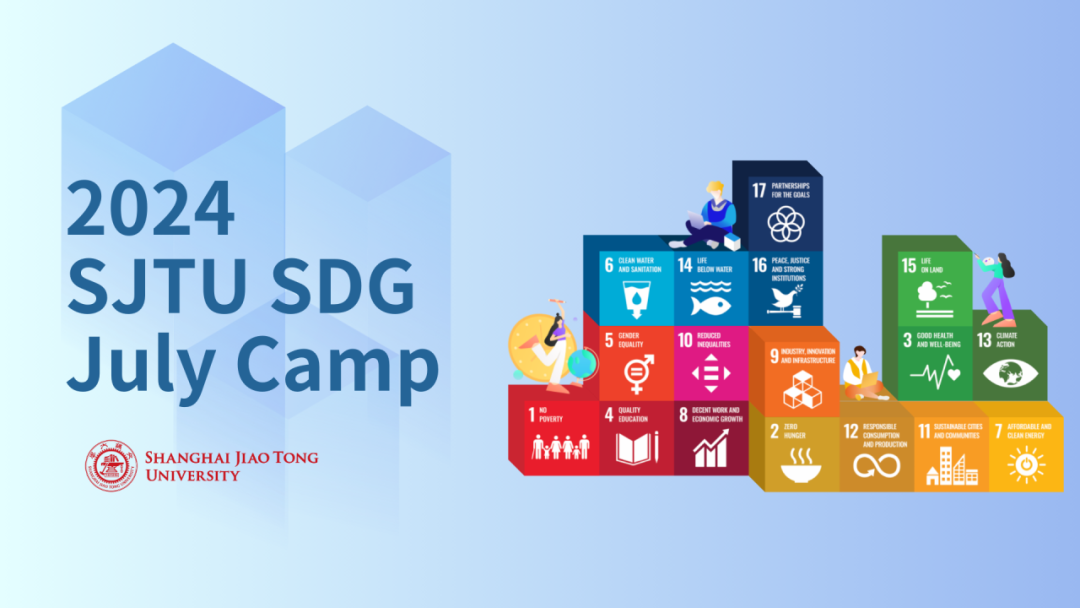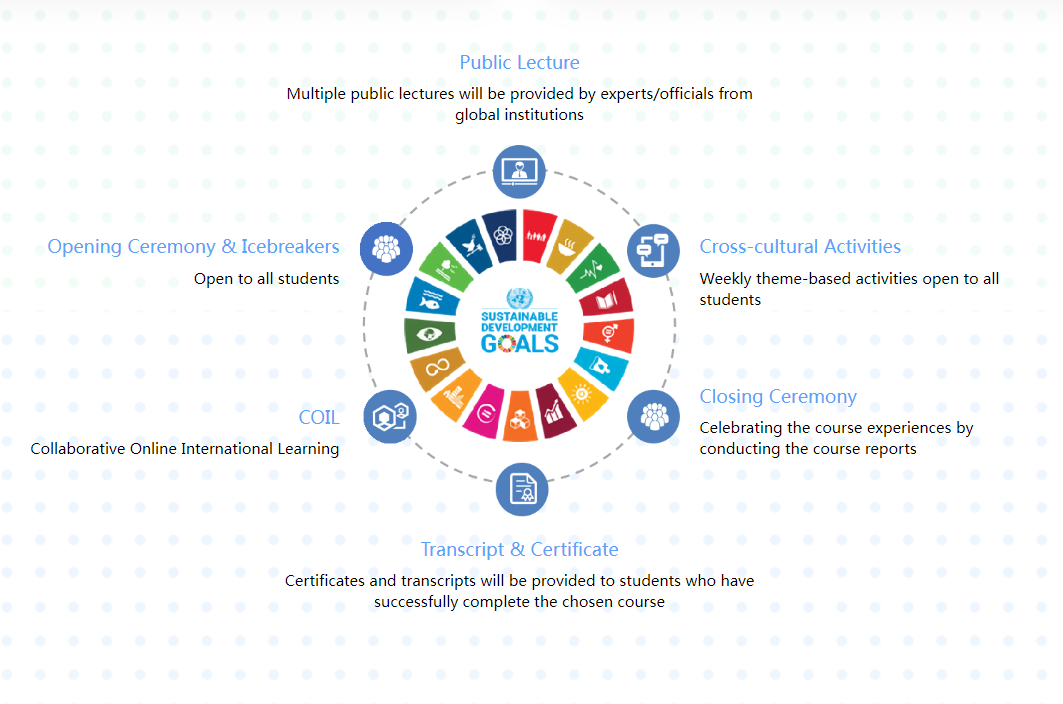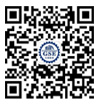
The SJTU SDG July Camp is an online program that integrates the United Nations Sustainable Development Goals (UN SDGs) within a multidisciplinary framework, engaging a diverse body of students over a series of collaborative and interdisciplinary online courses, lectures and activities.
This annual online program has been well-received by students since its very first round, and it continues to improve year on year. The feedback from the latest SJTU SDG July Camp in 2023 found that 96% of the participants rated their experience above four stars on a five-star scale.
This year, faculty members from SOE will offer 2 SDG-related courses. Through collaborative online international learning (COIL), you will engage in a virtual community and work with peers from around the world through group discussions, team work, and/or group projects. You will learn more about pressing problems in the world and formulate possible solutions. The student-oriented learning format will enable you to develop international cooperation skills and global competence.
If you are interested in the UN SDGs, enjoy meeting peers from around the world, and sorting out challenges in an online classroom setting, these courses are just RIGHT for you!

Course Overview 1:
Educational Challenges: Status and Solution Design
Relevant SDGs: SDG 3, SDG 4
Credit(s): 2 (32 teaching hours)
Course Description:
This course is a summer course for undergraduates. It primarily introduces some of the prominent challenges existing in the current global education system. Through a hands-on approach, the course aims to inspire students to design potential solutions to these challenges, enhancing their innovative thinking and practical abilities.
The main teaching content includes: (1) Global Education Status and Challenges: Discussing issues of global significance such as education accessibility, equity, and quality. (2) Technology and Education: Delving deep into how technology impacts education, including the digital divide, opportunities and challenges of online education, and how technology transforms teaching methods. (3) Diversity and Inclusivity in Education: Exploring how to cater to students of different backgrounds, abilities, and needs, including special education and multicultural education. (4) Educational Design Research Methods.
The primary learning objectives of this course are: (1) To learn and understand the main challenges in the contemporary education system, including the themes and underlying historical, societal, economical, and cultural reasons. (2) To learn and master educational design research methods. (3) To co-create solutions to educational challenges based on educational design methods.
Specifically, the course aims to foster the following abilities in students: (1) Understanding and Analytical Skills: To understand and analyze the main challenges faced by contemporary education, as well as the social, economic, and technological factors behind these challenges. (2) Critical Thinking Skills. (3) Practical and Application Skills: Students will learn how to design and implement effective educational methods to address specific educational challenges. (4) Interdisciplinary Collaboration Skills: Encouraging students to collaborate with peers from different backgrounds and fields to jointly explore and solve educational issues.
Academic Team
-
Xin Tang, Associate Professor, SJTU School of Education, xin.tang@sjtu.edu.cn (PI)
-
Jiesi Guo, Associate Professor, Australian Catholic University, jiesi.guo@acu.edu.au (Collaborator)
-
Sanna Read, Assistant Professorial Research Fellow, London School of Economics and Political Science, s.read@lse.ac.uk (Collaborator)
-
Henna Asikainen, Senior Lecturer, University of Helsinki, henna.asikainen@helsinki.fi (Collaborator)
Gender in Development and Education
Relevant SDGs: SDG5 – Gender Equality; SDG4 – Quality Education
Credit(s): 2(32h)
Course Description:
Promoting gender equality and educational equity stands as a pivotal objective within the United Nations' 2030 Sustainable Development Goals (SDGs). It encapsulates empowering women and girls, transcending mere fundamental rights to deeply intertwine with global peace and societal progress. Education emerges as a potent avenue to bolster the agency of women on a worldwide scale, with educational equity and gender equality acting in symbiosis. This course, framed on a global canvas, aims to showcase exemplary policies and practical implementations of gender equality and educational equity across nations, guided by the SDGs.
Expertise from professionals engaged in international organizations will illuminate the forefront of educational practices fostering gender equality globally. Leveraging a project-based learning approach, integrating timeless theories from education and sociology, participants will acquire research knowledge and methodologies pertinent to the subject matter. The course endeavors to equip students with fundamental insights into gender and education within the realm of international development. Students will grasp cutting-edge policies and practices in the global arena, broadening their global perspective and nurturing a sense of a shared human destiny—a crucial component of a sustainable future.
Furthermore, students will delve into educational and sociological theories, engaging in profound interactions and collaboration with international peers from diverse disciplines. This cross-disciplinary exchange aims to enhance their global competence.
Academic Team
-
Ziyin Xiong, Lecturer, SJTU School of Education, ziyin.xiong@sjtu.edu.cn (PI)
-
Marek Kwiek, professor, UNESCO Chair in Institutional Research and Higher Education Policy, director of Institute for Advanced Studies in Social Sciences and Humanities (IAS) and Center for Public Policy Studies (CPPS), AMU University of Poznan, Poland. marek.kwiek@amu.edu.pl (Collaborator)
-
Zhang Xianshuang, Gender Specialist at Asian Development Bank, xzhang9.consultant@adb.org (Collaborator)
Reference: SJTU SDG July Camp - International Affairs Division
Edited by CHEN Ruoxi




